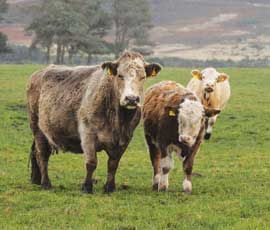Wet weather raises trace element deficiency risk

Unprecedented wet weather may have leached trace elements from soils and could be to blame for poor fertility and low performance in ruminants.
Experts say trace element deficiencies are likely to be widespread this year, with heavy rain affecting most parts of the UK.
Lois Philipps, British Grassland Society director, says soluble trace elements might have been washed out of the ground by rain.
“There is a question of availability [of trace elements] because of poor root development and soil compaction, with roots unable to get through waterlogged soil and access nutrients.”
Deficiencies of the main trace elements – zinc, cobalt, iodine, copper and iron – are associated with a weak immune system, poor metabolism, infertility and pregnancy problems.
Recently there have been a high number of farmers reporting fertility problems. Ms Philipps says some farmers might unknowingly have a trace element deficiency.
| Farmers Weekly has reported on the high incidence of early lambing and calf losses. We need your help to build a UK-wide picture of what is happening on individual farms and what the cause could be. If losses are a problem in your flock or herd this year, let us know by filling in our short six-question survey. |
|---|
“Farmers may not suspect a trace element problem because of all the other issues they’re experiencing [such as poor nutrition]. It is not the first thing that springs to mind.”
Independent vet Paul Roger strongly advises farmers to get blood samples completed to test for trace element depletion in livestock.
“Every year is going to be different, so it is always a good idea to take blood samples from animals,” he explains.
He says a more accurate assessment of trace element deficiency is to conduct a liver biopsy, which gives an insight into the level of reserves of trace elements.
Mr Roger says samples should be taken at critical times in the production cycle, including mid-pregnancy for beef cattle and sheep and at peak production in dairy cattle.
David Hendy, independent nutritionist, warns farmers shouldn’t rely on historic knowledge of trace element levels in soils and should also get soil samples taken.
“This year could be very different because of the wet weather,” he adds. He recommends also getting forage analysis done to assess the levels in terms of trace elements.
Signs of trace element deficiency are fairly easy to spot, says Mr Hendy, and can be treated with a bolus, which can be administered orally into the rumen. “If animals look unthrifty or their coats are looking poor, there may be some form of trace element deficiency.”
Beef producer Sam Chesney, from Kircubbin, Northern Ireland, is reporting a 12% barren rate in his spring calving 150-suckler herd this year. He believes an iodine deficiency is to blame, after a routine blood sampling of 10% of the herd revealed unprecedented low levels of the trace element.
Mr Chesney now plans to bolus his herd early next year to allow the steady release of nutrients over a six-month period during calving through to mating.
Meanwhile, Ms Philipps says soil management is going to be key to addressing the problem next year.
Do you think trace element deficiencies may be an issue on your farm? Let us know and get involved in the discussion on Livestock Lines forum.
